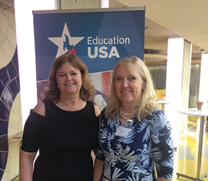
Dr. Maura Iversen with the Swedish Fulbright representative, Monica Dahlén.
She understands this as both a scholar and a parent, because her daughter Christina was diagnosed with JIA at age 4.
“Children with JIA are often treated differently,” Dr. Iversen notes. “They may be kept from activity by adults who fear injury, and they may be fearful themselves to become too active and risk aggravating painful inflammation.”
In the clinical care setting, Dr. Iversen suspects two important barriers may prevent proper assessment of physical activity, which ultimately will impact the design of physical activity interventions:
- Physical activity questionnaires don’t fully ascertain physical activity measures in children, and
- Fitness trackers are not capturing the full picture of a pediatric patient’s daily activity due to unique limitations of movement capture or restrictions on use (e.g., cannot be worn in water or cannot capture cycling).
Given the prevalence of JIA in Sweden, as well as a robust national registry and active patient organization for patients with JIA, Dr. Iversen has found Sweden to be an ideal location for a study that includes good baseline data, involved patients and a community with physical activity as a cultural norm.
Testing a Pediatric Activity Questionnaire in Sweden
Dr. Iversen is leading a phased study working with Swedish parents and their children living with JIA to test a unique pediatric physical activity questionnaire she designed. Through cognitive interviews with children taking the questionnaire, Dr. Iversen is investigating how a physical activity questionnaire designed specifically for pediatric and adolescent patients with JIA can more accurately collect patient information.
“Children with JIA are often asked about physical activity based on questionnaires designed for adults. Too often, these questionnaires don’t ask questions in the right way for a child to connect with,” Dr. Iversen explains. “Children are very literal, and questions need to address this to secure an accurate answer.”
She also says that when a child answers a two-part question, they are most likely to only answer the first part, which can also skew the accuracy of their response.
Data from these cognitive interviews will then be used to test the comprehensibility and validity of the questionnaire for application on a tablet. Her goal with this electronic format for the questionnaire is to provide a more streamlined method to collect consistent annual data from pediatric patients and follow their longitudinal physical activity.
Dr. Iversen hopes to integrate this electronic, evidence-based pediatric physical activity questionnaire through the Swedish JIA patient network to a broader population of Swedish patients with JIA. She also plans to compare these data on physical activity among Swedish children with JIA to children living with JIA in the U.S. to understand how cultural norms of physical activity may translate to children with JIA.

